On July 19, Russian President Vladimir Putin visited Tehran to boost ties with his Iranian and Turkish counterparts. The trip came just three days after President Biden toured the region to rally support against Iran. Relations between Russia and Iran have steadily improved, according to Gallup analysis, after a long history of tensions. “We can boast record figures in trade growth,” Putin said at the start of his meetings. “We are strengthening our cooperation on international security and making a tangible contribution to settling the Syrian conflict.”
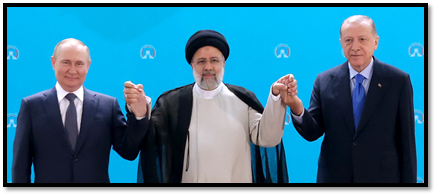
Both countries were under U.S. sanctions and faced mounting challenges from Western powers – Iran for its nuclear advances and Russia for its invasion of Ukraine. “World events show Iran and Russia’s need for increasing mutual cooperation,” Supreme Leader Ayatollah Ali Khamenei told Putin. Khamenei explicitly backed Moscow’s position on Ukraine and called NATO a “dangerous” entity. “War is a violent and difficult endeavor... But in the case of Ukraine, if you had not taken the helm, the other side would have done so and initiated a war.”
Putin’s meetings covered:
- Iran-Russia relations
- The United States, the West and Israel
- The war in Ukraine
- The security situation in Syria
As part of the summit, the National Iranian Oil Company and Russia’s Gazprom committed to a $40 billion development deal: Gazprom said it would help develop two natural gas fields, and six oil fields, pipelines and other infrastructure.
Putin’s trip “speaks volumes” about how both Russia and Iran are isolated internationally, Robert Malley, the U.S. special envoy for Iran, told CNN on July 19. Iran has a choice between “relative dependency on Russia” or coming back into compliance with the 2015 nuclear deal, he said. In June 2022, diplomacy to revive the historic agreement faltered after two days of last-gasp talks conducted indirectly between the United States and Iran by an E.U. diplomat in Qatar.
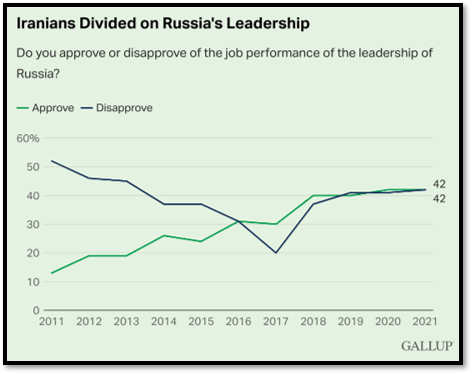 The visit follows a U.S. warning that Iran was planning to provide Russia with hundreds of drones. Russia “has to turn to Iran for help” with replenishing its military arsenal, John Kirby of the National Security Council said on July 19. Putin “wants to go buy several hundred UAVs [unmanned aerial vehicles] to continue to prosecute this illegal war and to continue to kill Ukrainians.”
The visit follows a U.S. warning that Iran was planning to provide Russia with hundreds of drones. Russia “has to turn to Iran for help” with replenishing its military arsenal, John Kirby of the National Security Council said on July 19. Putin “wants to go buy several hundred UAVs [unmanned aerial vehicles] to continue to prosecute this illegal war and to continue to kill Ukrainians.”
A 2021 Gallup poll showed that Iranians were split on their views of Russia’s leadership, after a long history of contentious relations. “Iranians have warmed to Russia's leadership over the past decade, but they remained divided before Russia's 2022 invasion of Ukraine,” according to Gallup. Between 1941 and 1946, Soviet troops occupied parts of Iran’s northern provinces. The Soviet Union supported the secession of Iranian Azerbaijan and Kurdistan at the end of World War II. Joseph Stalin’s initial refusal to withdraw led to the first crisis of the new U.N. Security Council. Until 1989, the Soviet empire bordered Iran.
At the trilateral summit, the three presidents discussed the future of Syria as part of the 19th meeting of the Astana peace process. The Astana initiative, launched in 2017, was intended to complement U.N.-sponsored peace talks in Geneva. In their joint statement in Tehran, the three leaders reiterated support for a political settlement in the 11-year civil war and committed to fighting terrorism. They also called on the United States to withdraw the estimated 1,000 troops from Syria.
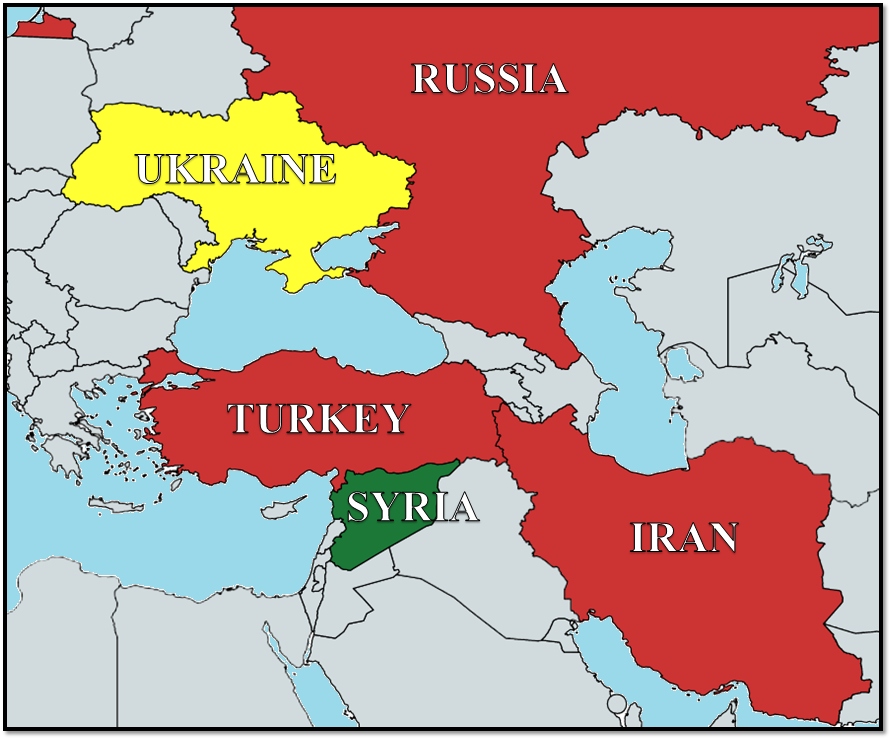 Russia and Iran refused, however, to support a further Turkish military incursion into northern Syria. Erdogan had talked publicly for weeks about establishing an 18.5-mile “safe zone” along the border. “You say you understand Turkey’s concerns and we thank you for this,” Erdogan told Putin and Raisi. “But words alone are not enough.” He said that Turkey could fight terrorist organizations in Syria with or without help from Iran and Russia.
Russia and Iran refused, however, to support a further Turkish military incursion into northern Syria. Erdogan had talked publicly for weeks about establishing an 18.5-mile “safe zone” along the border. “You say you understand Turkey’s concerns and we thank you for this,” Erdogan told Putin and Raisi. “But words alone are not enough.” He said that Turkey could fight terrorist organizations in Syria with or without help from Iran and Russia.
The trip was Putin’s second one abroad since Russia invaded Ukraine in February 2022. It was his fifth to Tehran. The following are excerpted remarks by Iranian, Russian and Turkish leaders organized by subject.
Supreme Leader Ayatollah Ali Khamenei
On Iran-Russia relations
In a meeting with Putin and Raisi on July 19: “World events show Iran and Russia’s need for increasing mutual cooperation. This cooperation is deeply beneficial to both countries. The numerous memorandums of understanding and contracts between the two, including in oil and gas sectors, should be followed up and fulfilled to the end.”
“Iran and Russia’s long-term cooperation is greatly, deeply beneficial to both countries. You, Mr. Putin, and our President [Raisi] are people who take action and follow up on it. Thus, cooperation between the two countries should reach a peak in this period.”
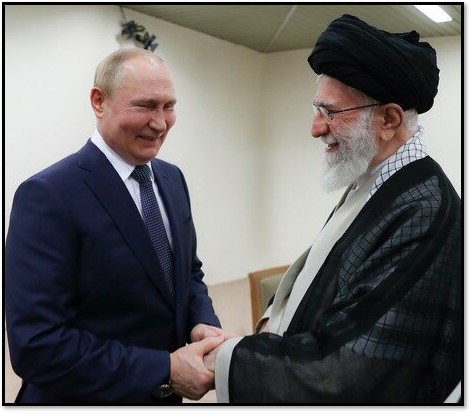
On Syria
In a meeting with Putin and Raisi on July 19: “Iran’s stance is opposition to a military attack on Syria, such an action should be prevented. Another important issue in Syria is the usurping of fertile, oil-rich regions to the east of the Euphrates by the Americans. This should be solved by expelling them from the region.”
In a meeting with Raisi and Erdogan on July 19: “Maintaining the territorial integrity of Syria is very important and any military attack in northern Syria will definitely harm Turkey, Syria and the entire region, and it will benefit the terrorists. This is definitely to the detriment of Syria, Turkey, and the region. It will not achieve the expected political results from the Syrian government.”
“You also consider the security of Syria to be your security. The Syrian issues should be resolved through negotiations, and Iran, Turkey, Syria and Russia should resolve this issue through dialogue.”
On the United States, the West and Israel
In a meeting with Putin and Raisi on July 19: “NATO is a dangerous entity. The West is totally opposed to a strong, independent Russia. If the way is opened for NATO, it will recognize no limits. If it hadn’t been stopped in Ukraine, it would have later started a similar war in Crimea.”
“Of course, today, the U.S. and the West have become weaker than before. And despite expending great effort and money, the influence of their policies in our region – including in Syria, Iraq, Lebanon and Palestine – has significantly declined.”
“The dollar should be gradually removed from global transactions, and this is possible over time.”
In a meeting with Raisi and Erdogan on July 19: “Today, neither the Zionist regime, nor the U.S., nor others will be able to stop the deep-rooted movement of the Palestinians, and the end result will be in the interest of the Palestinian people.”
On Ukraine
In a meeting with Putin and Raisi on July 19: “War is a violent and difficult endeavor, and the Islamic Republic is not at all happy that people are caught up in war. But in the case of Ukraine, if you had not taken the helm, the other side would have done so and initiated a war.”
On relations with Turkey
During a meeting with Raisi and Erdogan on July 19: “As you said, we are friends of each other in difficult times and we pray for the Muslim nation of Turkey. Turkey has never been silent in the face of injustices against Iran, and the brotherhood of Iran and Turkey should expand in all areas.”
President Ebrahim Raisi
On Iran-Russia relations
In a meeting with Putin on July 19: “After our visit and the meeting in Moscow and then in Ashgabat, everything has been developing very quickly, including our bilateral relations. Both sides have the political will needed to develop our ties and to put them into practice.”
On Syria
In a meeting with Putin on July 19: “We have good, substantial experience on the Syrian track. I think this experience and our cooperation have made this region safer. Other countries merely claim to be fighting terrorism. Meanwhile, our relations and cooperation in counterterrorism have proved our ability to reach the goals we set for ourselves. I believe this is a very valuable experience in enhancing security in our region.”
In a speech at the Astana peace process summit on July 19: “Today, about 11 years have passed since the beginning of the Syrian crisis, the Islamic Republic of Iran still believes that the only solution to the Syrian crisis is political, and military action is not only ineffective, but will worsen the situation.”
“Right now, we are holding the summit of the Astana process, while unilateral sanctions, especially by the United States, have put additional pressure on the Syrian people and deprived them of the possibility of a normal life, and it has become clear to everyone that the parties who did not succeed by creating insecurity and instability in Syria to achieve their political goals, are now seeking to fulfil their illegitimate demands through other methods and with the policy of sanctions and pressure.”
“A united, independent Syria without illegal foreign presence will not only lead to the return of peace to the people of this country after years of suffering, but will also contribute to the stability and security of its neighbors. The illegal presence of the occupying forces of the American regime has become a destabilizing factor for Syria and the region. America, while increasing illegal military bases, is looting Syria's natural resources, especially their oil, and I emphasize that it is necessary for the country's forces to withdraw from the entire region, including Syria, as soon as possible.
“We also strongly condemn the increase in the scope of the Zionist Regime's encroachments on Syrian territory and the targeting of the country's basic infrastructure, including airports and ports. It has become clear to everyone that this regime has linked its survival to aggression and insecurity in our region, and such actions, along with the occupation of the Golan region, are a violation of the sovereignty of the Syrian state and a factor of instability and a threat to regional and international peace and security, the consequences of which will of course be faced by this occupying regime.”
Russian President Vladimir Putin
On Iran-Russia relations
In a meeting with Raisi on July 19: “Our relations have been developing at a good pace, indeed. We boast record figures in trade growth. We are strengthening our cooperation on international security and making a tangible contribution to settling the Syrian conflict.”
In an interview on July 19: “As for my meeting with President Raisi, we discussed primarily economic matters. I would like to note that Russian-Iranian trade has grown by 40 percent over the past six months. This is a very good indicator.
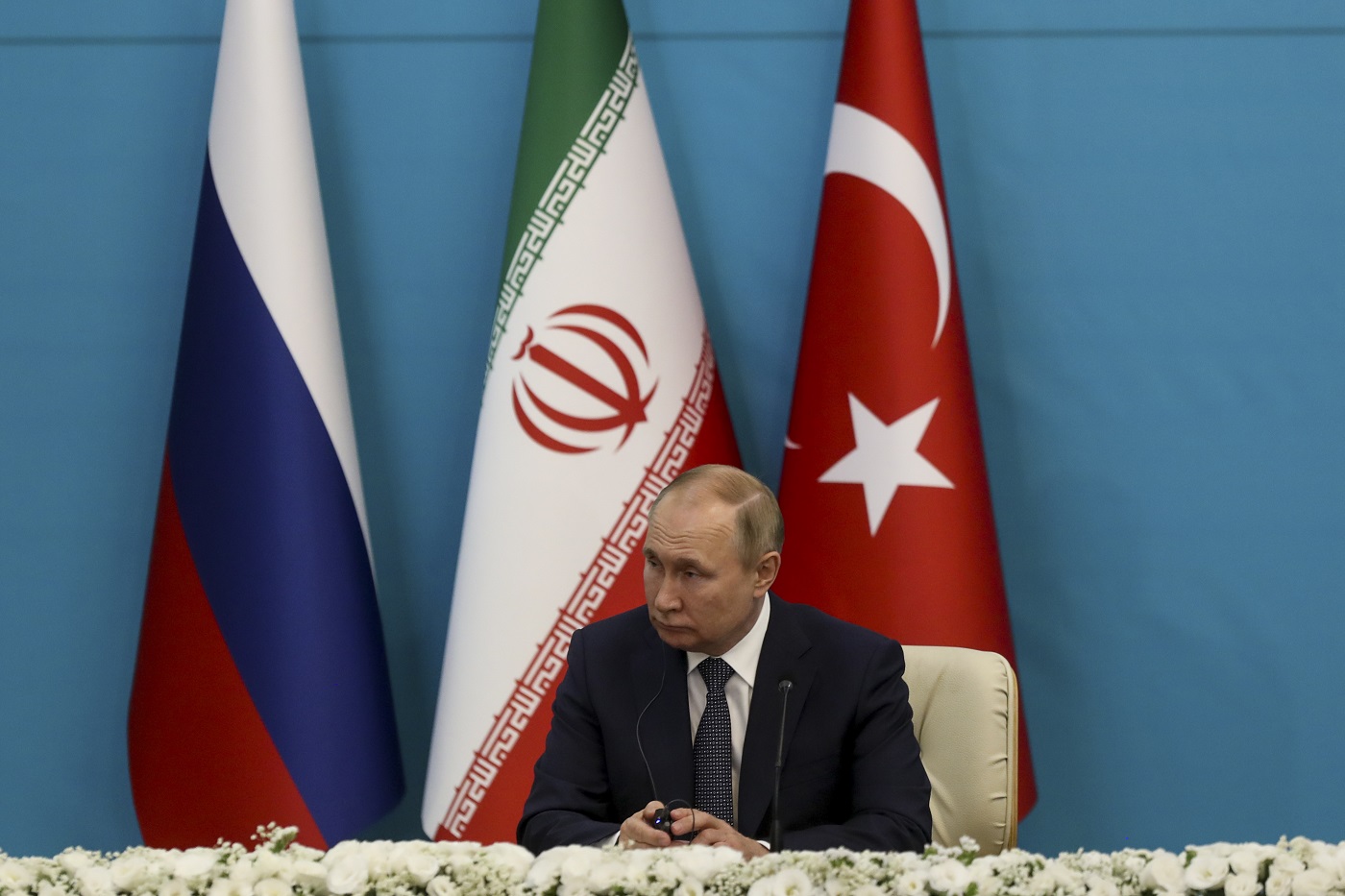
“There are promising spheres for our cooperation, and there is a great variety of them, like infrastructure development. You may know that a deputy prime minister of the Russian Government chairs a group that is responsible for developing relations in the South Caucasus, including infrastructure projects in the South Caucasus, that is, in Azerbaijan, Armenia and Russia. A great deal can be achieved in this sphere in cooperation with Iran.
“As you know, the first pilot train is travelling along the North-South Railway line. It is a short route to ports in the south of Iran, which further leads to the Persian Gulf and India.
“There is a practical project: the Rasht-Astara railway is a short 146-kilometre line across Iran. Azerbaijan is interested in its construction. I recently met with President Aliyev during the Caspian Summit, and we discussed this matter. Iran is interested in this as well, as our Iranian partners have told us just now. Russia is interested in this, because it will connect Russia’s northern region, St Petersburg, directly to the Persian Gulf. It is a very interesting and promising project. The task now is to build this line, which is only 146 kilometers. Russia is ready to do this.
“We need to coordinate the conditions of this construction project. We have discussed its general outlines with our Iranian partners and friends, and we have coordinated it with Azerbaijan. I hope we will get down to business now. And then, it will be an interesting job for us. It actually amounts to exporting the services of Russian Railways (RZD). This is one of the relevant examples.
“There are other spheres. There are security issues relevant to Iran’s nuclear program. It was very important for us to understand the sentiments of the Iranian party regarding this work. It also involves Russia, which is contributing to the joint efforts aimed at relaunching interaction between Iran and the IAEA. I will not speak about this now, but Russia is playing a considerable role in this.”
In a meeting with Supreme Leader Ayatollah Khamenei and Raisi on July 19: “Russia and Iran are devising new methods to use their own national currencies in their relations.”
On Ukraine
In a meeting with Supreme Leader Ayatollah Khamenei and Raisi on July 19: “Some European countries even said that they were opposed to the membership of Ukraine in NATO, but that they agreed to it under the pressure of the U.S. This is indicative of their lack of authority and independence.”
“These sanctions will work to the disadvantage of the West, and they will lead to problems such as an increase in the price of oil and a food crisis.”
On Syria
In a meeting with Supreme Leader Ayatollah Khamenei and Raisi on July 19: “The region to the east of the Euphrates must be under the control of Syrian military forces.”
“Iran and Russia are fighting together against terrorism in Syria. In the area of the military too, we will try to increase the level of cooperation between the two countries and also increase trilateral cooperation and military maneuvers with China.”
At the Astana peace process summit on July 19: “Let me stress that the situation on the territories outside the control of the Syrian government is particularly concerning. We see real threats of crime, extremism and separatism coming from those regions. This is largely allowed through the destructive policy of the Western states led by the US which are using a broad arsenal of political and economic measures, are strongly encouraging separatist sentiment in some areas of the country, as the President of Iran just mentioned, and plundering its natural resources with a view to ultimately pulling the Syrian state apart. So, it would be best to take extra steps in our trilateral format aimed at stabilizing the situation in those areas and at returning control to the legitimate government of Syria.”
In an interview on July 19: “There is some disagreement about what is happening in Northern Syria. Incidentally, we also have some common ground here: all of us believe that US troops should leave this area. This is the first point. And they should stop looting the Syrian state, the Syrian people, taking their oil illegally. But there is disagreement about how to organize and stabilize the situation in that region. As you know, Russian-Turkish observation convoys are working there together.
“However, in our view, in order to ensure a long-term, stable situation there it is necessary to transfer the entire territory under the control of the official authorities in Damascus, under the control of the Armed Forces of the Syrian Arab Republic, and then it will be possible to hold a dialogue with those who are responsible – in this case the official Syrian authorities. I believe it would greatly stabilize the situation there.”
Turkish President Recep Tayyip Erdogan
On relations with Iran
In a meeting with Supreme Leader Ayatollah Khamenei on July 19: “Turkey has never been silent in the face of injustices against Iran, and the brotherhood of Iran and Turkey should expand in all areas.”
In remarks during a press conference with President Raisi on July 19: “We had previously aimed to reach a trade volume of 30 billion dollars, which unfortunately due to the spread of coronavirus, this volume of trade decreased significantly. Currently, the trade volume of the two countries has reached 7 billion dollars, but we believe that with the determination of the two countries, we will be able to reach the trade volume of 30 billion dollars.”
On Syria
In a meeting with Supreme Leader Ayatollah Khamenei on July 19: “In Syria, terrorist groups are supported by heavy weaponry from Western countries such as Germany, England, France, and especially the United States.”
“We expect the Syrian government to start political processes. At the Astana process, the Syrian issue is on the agenda, and we hope to achieve good results.”
On terrorism
In remarks on July 19: “Our fight against terrorist organizations will continue everywhere. We expect Russia and Iran to support Turkey in this struggle.”
Joint Statement on Syria by the Presidents of Iran, Russia and Turkey
“The Presidents:
- Discussed the current situation on the ground in Syria, reviewed the developments following the last virtual summit on 1 July 2020 and reiterated their determination to enhance the trilateral coordination in light of their agreements as well as conclusions of foreign ministers and representatives’ meetings. Also, examined the latest international and regional developments and emphasized the leading role of the Astana Process in peaceful and sustainable settlement of the Syrian crisis.
- Emphasized their unwavering commitment to the sovereignty, independence, unity and territorial integrity of the Syrian Arab Republic as well as to the purposes and principles of UN Charter. Highlighted that these principles should be universally respected and that no actions, no matter by whom they were undertaken, should undermine them.
- Expressed their determination to continue working together to combat terrorism in all forms and manifestations. Condemned increased presence and activities of terrorist groups and their affiliates under different names in various parts of Syria, including the attacks targeting civilian facilities, which result in loss of innocent lives. Highlighted the necessity to fully implement all arrangements related to the north of Syria.
- Rejected all attempts to create new realities on the ground under the pretext of combating terrorism, including illegitimate self-rule initiatives, and expresses their determination to stand against separatist agendas aimed at undermining the sovereignty and territorial integrity of Syria as well as threatening the national security of neighboring countries including through cross-border attacks and infiltrations.
- Discussed the situation in the north of Syria, emphasized that security and stability in this region can only be achieved on the basis of preservation of the sovereignty and territorial integrity of the country and decided to coordinate their efforts to this end. Expressed their opposition to the illegal seizure and transfer of oil revenues that should belong to Syria.
- Reaffirmed the determination to continue their ongoing cooperation in order to ultimately eliminate terrorist individuals, groups, undertakings and entities, while ensuring the protection of the civilians and civilian infrastructure in accordance with the international humanitarian law.
- Reviewed in detail the situation in the Idlib de-escalation area and underscored the necessity to maintain calm on the ground by fully implementing all agreements on Idlib. Expressed their serious concern over the presence and activities of terrorist groups that pose threat to civilians inside and outside the Idlib de-escalation area. Agreed to make further efforts to ensure sustainable normalization of the situation in and around the Idlib de-escalation area, including the humanitarian situation.
- Expressed grave concern at the humanitarian situation in Syria and rejected all unilateral sanctions which are in contravention of international law, international humanitarian law and the UN Charter including, among other things, any discriminatory measures through waivers for certain regions which could lead to this country’s disintegration by assisting separatist agendas. In this regard, called upon the international community, particularly the UN and its humanitarian agencies and other governmental/non-governmental international institutions to increase their assistance to all Syrians without discrimination, politicization and preconditions and in a more transparent manner.
- Reaffirmed their conviction that there could be no military solution to the Syrian conflict and that it could only be resolved through the Syrian-led and Syrian-owned, UN-facilitated political process in line with the UN Security Council Resolution 2254. Emphasized in this regard the important role of the Constitutional Committee, created as a result of the decisive contribution of the Astana guarantors and the implementation of the decision of the Syrian National Dialogue Congress in Sochi. Reaffirmed the readiness to support the continuous interaction with its members and the UN Secretary-General’s Special Envoy for Syria Geir O. Pedersen, as facilitator, in order to ensure the sustainable and effective work of the next sessions of the Constitutional Committee. Expressed the conviction that the Committee in its work should respect the Terms of Reference and Core Rules of Procedure to enable the Committee to implement its mandate of preparing and drafting for popular approval a constitutional reform as well as achieving progress in its work and be governed by a sense of compromise and constructive engagement without foreign interference and externally imposed timelines aimed at reaching general agreement of its members. Underlined the necessity that it should conduct its activities without any bureaucratic and logistical hindrances.
- Reaffirmed their determination to continue operations on mutual release of detainees/abductees within the framework of the respective Working Group of the Astana format. Underscored that the Working Group was a unique mechanism that had proved to be effective and necessary for building confidence between the Syrian parties, and decided to further continue its work on the release of detainees and abductees and in line with its mandate on handover of bodies and identifications of missing persons.
- Highlighted the need to facilitate safe and voluntary return of refugees and internally displaced persons (IDPs) to their original places of residence in Syria, ensuring their right to return and right to be supported. In this regard, they called upon the international community to provide appropriate contributions for their resettlement and normal life as well as to undertake greater responsibility in burden-sharing and to enhance their assistance to Syria, inter alia by developing early recovery projects, including basic infrastructure assets – water, electricity. sanitation, health, educations, schools, hospitals as well as the humanitarian mine action in accordance with international humanitarian law.
- Condemned Israeli military attacks in Syria including to civilian infrastructures. Considered it as violating the international law, international humanitarian law, sovereignty and territorial integrity of Syria, and recognized it as destabilizing and intensifying the tension in the region. Reaffirmed the necessity to abide by universally recognized international legal decisions, including those provisions of the relevant UN resolutions rejecting the occupation of Syrian Golan, first and foremost UN Security Council Resolutions 242 and 497, which also consider all decisions and measures taken by Israel in this regard null void and have no legal effect.
- In addition to the Syrian issue, they confirmed their intention to strengthen trilateral coordination in different fields in order to promote joint political and economic cooperation.
- Agreed to assign their representatives with the task of holding the 19th International Meeting on Syria in the Astana format by the end of 2022.
- Decided to hold the next Tripartite Summit in the Russian Federation upon the invitation of President of the Russian Federation, H.E. Vladimir Putin.
- The Presidents of the Russian Federation and the Republic of Turkiye expressed their sincere gratitude to the President of the Islamic Republic of Iran, H.E. Seyyed Ebrahim Raisi for graciously hosting the Tripartite Summit within the framework of Astana format in Tehran.”
Photo Credits: President.ir; Gallup chart used with permission; Arash Khamooshi/The New York Times
